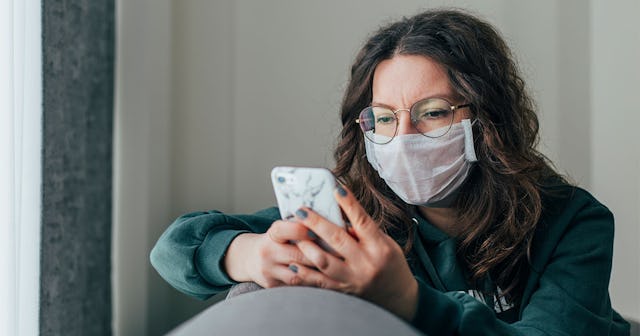Even When Life Returns to 'Normal,' It'll Take Your Mind A While to Catch Up

It’s been more than a year since the World Health Organization declared we were in fact living in a global pandemic. Since that sad time, a lot has changed. Cities, states, and entire countries have endured rolling shutdowns, or lockdowns. Activities we once took for granted, like going to the movies or a ball game, are now a no-go, and in many parts of the country — and world — it is still unsafe to mingle with close family members and friends. Many grandparents haven’t seen their kids or grandkids in 12, 13, or 14 months.
The good news is that things are looking up. Millions of Americans have received — or soon will receive — the COVID-19 vaccine. According to President Joe Biden, all American adults will be eligible by May 1, and if things continue on the projected path, we may see a semi-normal summer. “By July the 4th, there’s a good chance you, your families, and friends will be able to get together in your backyard or in your neighborhood and have a cookout or a barbecue, and celebrate Independence Day,” Biden said on March 11.
“After this long, hard year,” Biden added, “that will make this Independence Day something truly special, where we not only mark our independence as a nation, but we begin to mark our independence from this virus.”
Of course, this all sounds appealing. I mean, I cannot wait to sip on a cold brew on the beach along with several of my closest friends. But freedom from the virus and freedom from ourselves are two very different things — i.e., just because we may be physically ready to mingle doesn’t mean that we will be mentally prepared. Why? Because the collective trauma we’ve endured over the last 12 months is just that: a trauma. And it will take time for us to heal.
“The experience of heightened arousal, difficulty sleeping, irritability, wanting to drink and smoke to cope — all of those manifestations of stress may take a while to subside, because our nervous system has been chronically dialed up for a year now,” Adrienne Heinz, a research psychologist at the Stanford University School of Medicine, recently told Wired. “Just because a war is over, doesn’t mean that what happened during the war doesn’t still activate you, doesn’t still haunt you in some ways. There’s a healing that will need to take place.” Our minds need to mend. We need to grieve and recalibrate.
But that’s not all: We need to (re)secure our lives as we knew them, i.e. human beings thrive on certainty. On normalcy and routine. And for most that means having financial stability — and job security. It means school, work, mortgages, relationships, love, and kids. It also means feeling safe outside of our homes, with or without masks. It means being comfortable in a shopping mall, on the street, or in the grocery store.
“For some people, this event may be a shock to their… system,” Richard Tedeschi, a professor at the University of North Carolina and chair of the Boulder Crest Institute for Posttraumatic Growth, tells the American Psychological Association. “And while we don’t know yet what might happen… [COVID-19] will present serious challenges to people’s lives.” However, all is not lost. We will recover. There is hope.
“Once folks get out of survival mode and their basic needs are met, there’s going to be a reshuffling and a reprioritization of how we live and who we live with, and who we love and how we love,” Heinz says. “There will be a reckoning. Once you can financially take care of what you need to, and your children have school to attend, and you actually have the cognitive bandwidth to process what happened, certain insights will come to light about what’s best for you moving forward,” and these insight, Heinz predicts, will be positive.
“The pandemic has kind of been like this emotional and spiritual car accident,” says Heinz. “We’re being pulled out by the Jaws of Life, and we have this new opportunity to live.”
Tedeschi, ironically, agrees. “[This event] has the potential to result in significant positive changes… and while this situation presents a challenge to people’s lives, some people will be able to emerge from this for the better.”
In the meantime, the best way to manage COVID-19-induced anxiety and stress is to stay and be present. To slow down. It’s also important to remember to breathe and grief. No reaction is wrong. All of the emotions you may be feeling are normal and okay.